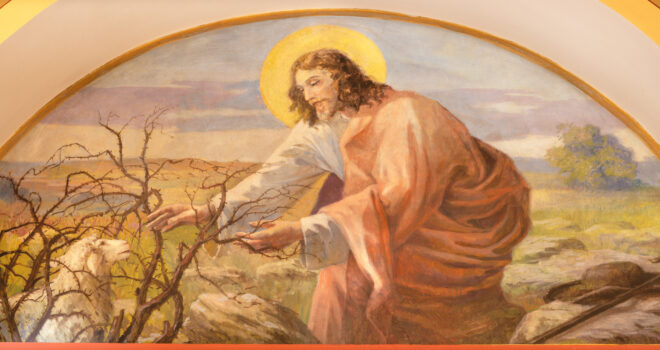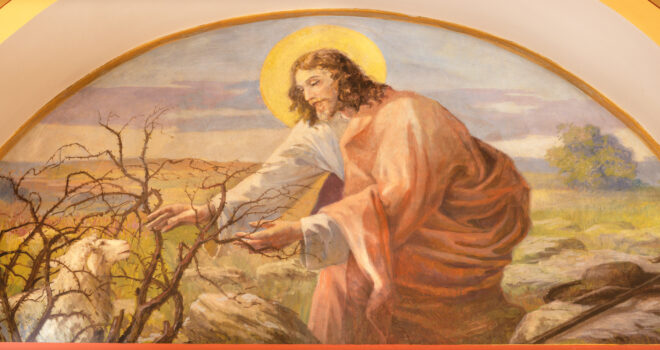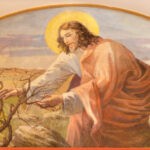Today’s readings teach us about the care of sheep—they need a gate to protect their sheepfold, a shepherd who will lead them to good pasture, and ears to hear the Voice they should follow.
Gospel (Read Jn 10:1-10)
Today’s reading is best understood within its context in John’s Gospel. In the previous chapter is the account of Jesus’ healing of the man born blind, a Lenten lectionary reading. Recall that it was a lesson about spiritual sight and blindness. The simple blind Jewish man whom Jesus healed was able to see and worship Jesus as the Messiah. The Pharisees who interrogated him, however, wanted nothing to do with Jesus: “We know that God has spoken to Moses, but as for this man, we do not know where he comes from” (Jn 9:29). If we remember that the Pharisees considered themselves to be the spiritual leaders of Judah, able to instruct the people in the fine points of the Mosaic Law and thus preserve their identity as God’s people, we will comprehend why Jesus begins speaking in John 10 about sheep gates, shepherds, and flocks. The Pharisees repeatedly acted as blind guides for God’s people, trying to insure a following for themselves. Jesus is about to expose them.
“Amen, amen, I say to you, whoever does not enter a sheepfold through the gate but climbs over elsewhere is a thief and a robber” (Jn 10:1). To make His point about the Pharisees, Jesus uses the well-known imagery of Israel as God’s flock and God Himself as their Shepherd (read Ez 34:11-16). Everyone willing to hear Jesus that day would have understood this metaphor. They knew that the sheepfold was where various flocks of sheep spent the night after a day of grazing. It consisted of a wall, to protect the flock from thieves and predators, as well as a gate. The gatekeeper would admit the shepherds in the morning as they came to take their flocks back out to pasture. Each shepherd’s flock responded to his call, because his voice was familiar to them. It was not a stretch for those listening to Jesus to understand that He was taking about God’s relationship with His people and leaders who had been given charge of them. They knew the beautiful prophecy from Isaiah: “He will feed His flock like a shepherd, He will gather the lambs in His arms, He will carry them in His bosom, and gently lead those that are with young” (Isa 40:11). However, notice the blindness of the Pharisees: “Although Jesus used this figure of speech, the Pharisees did not realize what He was trying to tell them” (Jn 10:6). So, what was He “trying to tell them”?
In the extended teaching of this chapter (some of which is not included in today’s reading), Jesus identifies Himself as both the sheep gate and the shepherd of Israel. The Pharisees were trying to lead God’s people without entering the sheepfold through the gate of Jesus. No one can teach and nurture God’s own flock apart from Jesus, because he is the Way, the Truth, the Life. The Pharisees believed the Law of Moses was an end in itself. Why would they need Jesus? The reality was that the Law pointed towards Jesus and was fulfilled in Him. Without Jesus, teachers of Israel robbed the flock , coming only to “steal and slaughter and destroy” (Jn 10:10).
Jesus also describes how the sheep recognize the voice of the one who has properly entered the sheepfold and who calls to them in a familiar, trusted way: “…they do not recognize the voice of strangers” (Jn 10:5). The sheep know they will find good pasture when they follow their true shepherd, not an impostor: “I came so that they might have life and have it more abundantly” (Jn 10:10).
Let us now follow, through all the other readings, this metaphor of sheep hearing their beloved shepherd’s call. How do they recognize His Voice?
Possible response: Jesus, Good Shepherd, You (and You alone) will lead me into abundant life. I trust in You.
First Reading (Read Acts 2:14a, 36-41)
If we are curious about how God’s flock will hear the Voice of the Good Shepherd, this reading in Acts provides us with an excellent demonstration. We are again on the Day of Pentecost, and Peter addresses the large crowd gathered around the hubbub caused by the descent of the Holy Spirit on the apostles. We can almost hear his raised voice booming out over the buzz: “Let the whole house of Israel know for certain that God has made both Lord and Christ, this Jesus whom you crucified” (Acts 2:14a). Here we have a “voice” calling out to God’s people (“the whole house of Israel”). Will the sheep recognize the voice? Will they trust the one calling to them? The rest of the story answers our questions.
“Now, when they heard this, they were cut to the heart…and they asked Peter and the other apostles, ‘What are we to do, my brothers?’” (Acts 2:37) The sheep recognize this as a call from God, delivered by His servant, Peter. They are convicted of their error in consenting to Jesus’ death. In deep humility, they seek reconciliation with the Father. Peter has approached the sheepfold through the gate of Jesus. He speaks to them on the basis of what Jesus has done, as well as about Jesus Himself. And it worked! They are ready to listen to the shepherd’s instructions. They believe he can lead them to safety.
Peter directs them to “repent and be baptized” (Acts 2:38). In this, they will receive forgiveness of their sins (for which now they are earnestly seeking), as well as the gift of the Holy Spirit (whose dramatic appearance got their attention in the first place). See how Peter acknowledges that what he announced to the people there that day was actually a call from God (and not just a man speaking): “For the promise is made to you and to your children and to all those far off, whomever the Lord our God will call” (Acts 2:39). The Voice of the Shepherd is spoken through the human voice of Peter, the one to whom Jesus gave charge of His Church. How very Catholic! If we want to hear the Voice of Jesus, we must listen to His Voice in the Church. No wonder all bishops carry shepherd’s staffs, to this day.
Possible response: Jesus, Good Shepherd, thank You for appointing shepherds to lead Your flock. We are never without our Shepherd’s Voice in the Church.
Psalm (Read Ps 23)
How did the psalmist hear the Voice of the Shepherd? He prayed to Him in grave danger, but with great intimacy: “Even though I walk in the dark valley, I fear no evil; for You are at my side” (Ps 23:4a). We hear the Shepherd’s Voice when we make the effort to hear it, especially in prayer. This is sometimes harder than it sounds. How easy it is for us, when we find ourselves in calamity, to focus primarily on the details of everything that is going wrong. The psalmist, however, looks for the Shepherd’s staff, talking to Him, and finding courage: “You are with me, Your rod and Your staff, they comfort me” (Ps 23:4b). The psalmist has given us words to use as a prayer when we seek to hear the Good Shepherd’s call to us: “The Lord is my shepherd; there is nothing I shall want.”
Possible response: The psalm is, itself, a response to our other readings. Read it again prayerfully to make it your own.
Second Reading (Read 1 Pet 2:20b-25)
What does the epistle have to say to us about hearing the Voice of the Good Shepherd? Actually, Peter gives us the most important key: we must acknowledge that we are like sheep, wanting to go astray (1 Pet 2:25). We must be willing to follow in the footsteps (1 Pet 2:21) of the One Who is the “guardian” of our souls (1 Pet 2:25). The most obvious lesson is the one sometimes most difficult to accept: we are sheep who need a Shepherd. We need the humility of the crowd on the Day of Pentecost, but we are so susceptible to the pride of the Pharisees, who wanted to lead instead of follow. If we are humble enough to be led, we will hear our Shepherd’s Voice, and, because we know we can trust Him, we will be willing to follow wherever He leads, even into suffering like His own.
Possible response: Jesus, Good Shepherd, I confess that sometimes I want to stray, trying to lead rather than follow. Please give me grace to walk in Your footsteps, wherever they might take me.
Photo by Renata Sedmakova on Shutterstock












